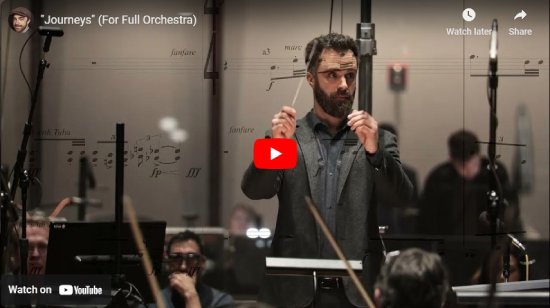Mikel Hurwitz calls himself an organizer of sounds, and indeed his work as a composer, musician, producer, and conductor enables him to do that in myriad ways. His film scores affect the moods and perceptions of audiences, whether they’re aware of it or not; his performing and production work bring out elements that alter how a piece of music is interpreted; and his conducting style shapes an orchestra’s music even as it’s being played.
These varied talents all came together during Hurwitz’s recent stint as a participant in the prestigious Los Angeles Film Conducting Intensive (LAFCI), a course led by Hollywood soundtrack veterans, designed to help screen composers develop their conducting skills.
“They select a group to write, orchestrate, conduct and record a piece of music in four days, and also prepare some existing pieces,” he says. “I’d never conducted a large orchestra before, so it was a new experience for me, and it was an incredible opportunity to study a score and think about how to conduct it. It’s a different part of the brain when you’re preparing a score to conduct rather than writing it. You’re thinking about all the different parts of the orchestra and all the individual players, and there was no click track, so it was a fun challenge.”
Hurwitz’s background is as diverse as his soundtrack œuvre, which includes scores for a Latinx comedy, a baseball documentary, a horror/comedy, and many Hallmark rom-coms. He has a history of social activism, with degrees in Political Geography and Latin American Studies from UBC, as well as in film scoring, from the Berklee College of Music. He lived in L.A. for eight years, working as Danny Elfman’s assistant on several movies (including The Grinch, Dumbo, Justice League, and Girl on the Train), before moving back to his hometown of Toronto two years ago. He plays a slew of instruments – piano, clarinet, percussion, guitar, and various stringed instruments from around the world – and has performed in classical orchestras, jazz trios, and improvisational ensembles, as well as with Cinemastasia, which provides live accompaniment to silent movies. And it all contributes to the goal of creating emotional impact for audiences.
“I feel like the degree to which I can sit down and improvise in different styles is pretty wide, and that helps,” says Hurwitz. “At the same time, I never like to be too on-the-nose, genre-wise, because that can come off as cheesy. I did a movie about an Argentine winemaker, for example, and the trick was to not go too far down the tango route. But there’s a way you can have a rhythmic idea played by an unexpected instrument, or an unexpected rhythm played by an expected instrument, that gives you a flavour without being too much.
“It’s fascinating psychologically, because as soon as you get too predictable, you lose the audience,” he adds. “You have to figure out that perfect balance between being evocative, supporting what’s happening on screen and in the script, and not going too far. There’s a certain magic that happens, I think. Even I don’t totally understand where a melody comes from when I’m reacting to a piece of film. It’s something that comes from the air, and my job is to watch it, and react, and let come what needs to come, and then go back and polish it.”
Hurwitz’s next project is making an album of his own music, and organizing its sound in other ways. “I recorded it with the Budapest Art Orchestra,” he says, “and I’m taking the recording and treating it like I’m remixing it, running it through synthesizers and chopping things up and reversing it and speeding it up and down and overdubbing instruments and doing all kinds of weird stuff to it. I’m playing on top of the orchestra in a lot of unexpected ways. It’s interesting.”
